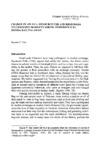Effects of CO2-induced ocean environmental changes on marine life: implications for aquaculture
| dc.contributor.author | Ishimatsu, Atsushi | |
| dc.contributor.author | Kurihara, Haruko | |
| dc.contributor.editor | Acosta, Belen O. | |
| dc.contributor.editor | Coloso, Relicardo M. | |
| dc.contributor.editor | de Jesus-Ayson, Evelyn Grace T. | |
| dc.contributor.editor | Toledo, Joebert D. | |
| dc.date.accessioned | 2013-12-05T13:48:04Z | |
| dc.date.available | 2013-12-05T13:48:04Z | |
| dc.date.issued | 2011 | |
| dc.identifier.citation | Ishimatsu, A., & Kurihara, H. (2011). Effects of CO2-induced ocean environmental changes on marine life: implications for aquaculture. In B. O. Acosta, R. M. Coloso, E. G. T. de Jesus-Ayson, & J. D. Toledo (Eds.), Sustainable aquaculture development for food security in Southeast Asia towards 2020. Proceedings of the Regional Technical Consultation on Sustainable Aquaculture Development in Southeast Asia Towards 2020 (pp. 35-44). Tigbauan, Iloilo, Philippines: SEAFDEC Aquaculture Department. | en |
| dc.identifier.isbn | 9789718511992 | |
| dc.identifier.uri | http://hdl.handle.net/10862/1821 | |
| dc.description.abstract | The world's oceans are becoming warmer and acidic. The atmospheric carbon dioxide concentration has increased from 280 ppm at pre-industrial revolution to above 380 ppm today. The 4th IPCC report predicts that it will range from 540 to nearly 1,000 ppm by the end of the century. The increased CO2 not only warms surface seawater, but also acidifies it (usually termed as ocean acidification) by diffusing across the ocean surface and forming carbonic acid. Our knowledge is still scarce as to how these ocean environmental changes will affect marine life. The early studies on the impact of ocean acidification focused on corals aiming to clarify effects of high-CO2 seawater on their calcification processes. However, more recent studies have revealed that in fact ocean acidification, either alone or coupled with warming, could have detrimental impacts on a variety of biological processes in different taxa. We have shown that early development of marine bivalves (oysters and mussels) could be severely disrupted under elevated CO2 conditions (ca. 2,000 ppm). When a marine shrimp was exposed to seawater equilibrated with air containing 1,000 ppm CO2 for 30 weeks, survival was only 55% as compared with 90% in the control. Gonad maturation of a sea urchin was delayed by one month under the same CO2 conditions at ambient temperature, but when accompanied with increased temperature of 2 degree C above ambient, gonad maturation was not only delayed but also significantly suppressed; the number of eggs in the ovary was reduced to only 20% of the control. It has been shown that tropical animals already live near their thermal tolerant maxima, and therefore even small increases of environmental temperature could reduce their environmental fitness. These recent findings bear significant implication in aquaculture and fisheries production, in particular, in tropical countries. This paper will summarize recent data on these topics and discuss possible adaptation measures. | en |
| dc.language.iso | en | en |
| dc.publisher | Aquaculture Department, Southeast Asian Fisheries Development Center | en |
| dc.subject | development | en |
| dc.subject | Echinoidea | en |
| dc.subject | Penaeidae | en |
| dc.subject | Eastern Pacific | en |
| dc.title | Effects of CO2-induced ocean environmental changes on marine life: implications for aquaculture | en |
| dc.type | Conference paper | en |
| dc.citation.spage | 35 | |
| dc.citation.epage | 44 | |
| dc.citation.conferenceTitle | Sustainable aquaculture development for food security in Southeast Asia towards 2020. Proceedings of the Regional Technical Consultation on Sustainable Aquaculture Development in Southeast Asia Towards 2020 | en |
| dc.subject.asfa | abiotic factors | en |
| dc.subject.asfa | corals | en |
| dc.subject.asfa | acidification | en |
| dc.subject.asfa | adaptation | en |
| dc.subject.asfa | growth | en |
| dc.subject.asfa | aquaculture | en |
| dc.subject.asfa | calcification | en |
| dc.subject.asfa | carbon dioxide | en |
| dc.subject.asfa | climate change | en |
| dc.subject.asfa | data processing | en |
| dc.subject.asfa | anthropogenic changes | en |
| dc.subject.asfa | environmental factors | en |
| dc.subject.asfa | fisheries | en |
| dc.subject.asfa | global warming | en |
| dc.subject.asfa | gonads | en |
| dc.subject.asfa | larval stage | en |
| dc.subject.asfa | marine environment | en |
| dc.subject.asfa | Oceans | en |
| dc.subject.asfa | ovaries | en |
| dc.subject.asfa | survival | en |
| dc.subject.asfa | temperature effects | en |
| dc.subject.asfa | water temperature | en |
| dc.subject.asfa | carbonic acid | en |
| dc.subject.asfa | ph effects | en |
このアイテムのファイル
このアイテムは次のコレクションに所属しています
-
Sustainable Aquaculture Development for Food Security in Southeast Asia Towards 2020 [17]
Proceedings of the Regional Technical Consultation on Sustainable Aquaculture Development in Southeast Asia Towards 2020 held from 17 to 19 March 2010 in Bangkok, Thailand





